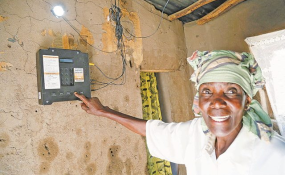By Athuman Mtulya
Dar es Salaam — Commentators have criticised the government’s response to the now-revoked electricity tariff increase, saying it does nothing to address the dire situation Tanzania Electric Supply Company (Tanesco) is in.
On Friday, the Energy and Water Utilities Regulatory Authority (Ewura) approved an 8.5 per cent increase in electricity charges after rejecting Tanesco’s initial request for an 18.19 per cent rise.
However, the Minister of Energy and Minerals, Prof Sospeter Muhongo, revoked the adjustment on Saturday, saying the ministry was not consulted.
On Sunday, President John Magufuli sacked Tanesco Managing Director Felchesmi Mramba. State House announced the decision in statement, but did not say why Mr Mramba was removed.
However, earlier in the day, Dr Magufuli told a congregation during New Year’s mass in Bukoba that his government had resolved to build an industrial economy and take electricity to villages, adding that “unilaterally” raising power tariffs was unacceptable.
Prof Honest Ngowi of Mzumbe University told The Citizen yesterday that developments of the last three days raised more questions than answers. He said adjustment of power tariffs was nothing new and had been overseen by Ewura since its establishment, adding that the authority was supposed to be an independent entity.
“I believe the same process and procedure was followed this time as well. Tanesco submitted its proposals, public hearings and consultations were conducted, and finally Ewura passed its verdict,” he said, adding, “But then we see the government reacting as if this whole issue was shrouded in secrecy. The question here is, where was the minister all along? Why didn’t the government stop the process at the outset and propose an the alternative to a tariff increase?”
Prof Ngowi said the decision could instil fear in regulators and State-owned firms.
“This has set a bad precedent and regulators might be apprehensive about executing their mandates. This is despite the fact that these authorities are supposed operate independently without political interference.”
Prof Haji Semboja of the University of Dar es Salaam said he fully supported President Magufuli’s goal of providing Tanzanians with affordable electricity, but voiced his concern about what he described as communication shortcomings within the government.
“Adjusting electricity charges is not a process that takes just one day. I believe the Tanesco board approved the matter before it was forwarded to Ewura, and government officials must have been aware of the development. This is why it is shocking to hear the minister say that he wasn’t consulted.”
Prof Semboja added that it was wrong to crucify one person for what essentially was a systemic problem.
“I don’t believe that only one person was involved from the beginning of the process to the very end. The entire system should have communicated and interpreted the President’s vision from the word go…it was a collective failure.”
Prof Ngowi, on the other hand, said reasons that prompted Tanesco to ask for a tariff increase should be addressed.
The two main reasons are increasing operational costs and the need to raise funds for infrastructure investment to attain the government’s goal of providing at least 75 per cent of the population with electricity by 2025.
“The government is supposed to spend heavily on infrastructure projects, but again citizens would feel the pinch because it is thorough taxes that the government gets money,” Prof Ngowi said.
“If you talk to industrialists and businesspeople they will tell you that it is better to pay higher tariffs and have reliable power than be charged less for power that is unreliable.”
He said the Union and Zanzibar governments should pay the Sh125 billion they owe Tanesco in outstanding bills. While the Union government has yet to pay Sh40 billion, Zanzibar owes Tanesco Sh85 billion.
“Can Tanesco by itself recover this colossal sum? How? Does it have the independence that could enable it to do so? Things have to change,” Prof Ngowi added.
Tanesco is also being crippled by the $16.76 million (Sh36.6 billion) monthly bill it pays a handful of independent power producers in capacity charges.
Also under scrutiny was whether the Energy and Minerals minister has powers to overturn decisions made by Ewura.
Prof Muhongo said in his letter to Ewura on Saturday that his actions were in line with the Electricity Act, 2008.
However, Kigoma Urban MP Zitto Kabwe said on social media yesterday that the minister should quote a specific clause giving him such powers.
Both the Electricity Act and Ewura Act give the regulator powers over all issues concerning tariffs, while the minister is essentially an overseer of policy.
However, Section 4 (2) of the Electricity Act bestows powers on the minister to coordinate emergency responses in close coordination with Ewura and Tanesco without being specific as to what constitutes an emergency.

